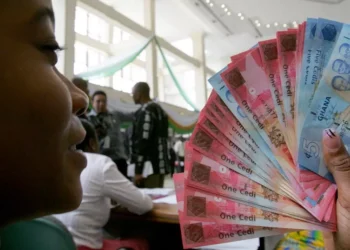Prof. Williams Kwasi Peprah, a US-based Associate Professor of Finance at Andrews University in Michigan USA, has blamed the Central Bank of Ghana as the cause for high inflation in the country.
The Bank of Ghana in a statement released on the 9th February, 2023, had justified financing Government of Ghana’s 2022 budget with about Gh¢44.5 billion.
According to the Central Bank, assisting government in its finance was part of a crises management tool used in dealing with the difficulties of 2022.
“It must be recognised that the ongoing debt operations are part of the corrective measures designed to address the financing problem of the budget. Bank of Ghana financing was part of a crises management tool used in dealing with the difficulties of 2022.”
Bank of Ghana
However, Professor Peprah during an interview divulged that the Central Bank’s justification does not hold.
“I don’t understand why the Bank of Ghana will have to rush and issue a justification in which it has a lot of problems.
“If you look at the Bank of Ghana’s statement, they have a line item which states that in 2018, the Parliament of Ghana suspended the Fiscal Responsibility Act, 2018, Act 982 in view of the crises precipitated by COVID 19 pandemic. The question is when did the Covid-19 pandemic come? It started in the early 2020. The suspension of the Fiscal Responsibility Act was done in 2020. So in their rush to defend themselves, they made an error which sometimes they have to take their time.”
Prof. Williams Kwasi Peprah
Expressing disappointment in certain actions of the central bank, Professor Peprah reckoned that the government refused to pay heed to advice by going to the International Monetary Fund (IMF) when the economy was experiencing challenges.
“I do understand that government had liquidity challenges starting from 2018 which academia and other political entities were cautioning government to be careful with the way we were going. Government did not listen that was why it went ahead to seek support from the IMF.”
Prof. Williams Kwasi Peprah
What has really happened with this impact of the ¢44.5 billion support for the country, according to the professor, is that the inflation rate which is about 54.1%, almost half, can be attributed to government’s actions.
Making a case for his opinion, the US-based Associate Professor noted that Ghana’s total revenue of Gh¢77 billion, indicating that the Gh¢44.5 billion granted to government as support from BoG is about 57.5% of the country’s revenue. “In economics and finance, when central banks lend, give overdraft, print of money, or engages in any act of monetization, there is a high rate of inflation in the country,” he pointed out.
He concluded that the Bank of Ghana must solely take the blame for the high inflation in the country.
“If BoG was to be very disciplined to tell the government that due to the economic challenges, the bank has no support or cannot give a support of more than half of the country’s total revenue, the situation would have been normalised.”
Prof. Williams Kwasi Peprah
Government’s 70% Achievement Is Enough For DDEP Implementation
Commenting on the issues surrounding the debt exchange program, Prof. Williams Peprah mentioned that a 70% achievement of the Domestic Debt Exchange Programme will be good for the government’s quest to successfully restructure the country’s debt.
According to him, his analysis of the data shows that the programme has largely been successful, and the majority of the entire debt portfolio of government comes from institutional investors who signed up for the programme.
“I know what the Finance Minister, Mr. Ken Ofori-Atta said regarding pegging the 80% target. The figure I’ve seen was basically based on institutional investors. With the additional percentage left to attain the 80%, probably government was thinking it will get some of the individual investors to sign onto the pack.
“If you look at the entire portfolio, more than 82% are in the hands of institutional investors. A little bit is in the hands of individual investors, 1.3% is in the hands of pension funds which were exempted.”
Prof. Williams Kwasi Peprah
He further communicated that the government is likely to achieve about 78% of the DDEP target.
“So my guess is that the 70% is good. I’m thinking that government will probably report about 75% to 78% of the Domestic Debt Exchange Programme and this is coming mainly from institutional investors.”
Prof. Williams Kwasi Peprah
Read also: REJOINDER: Bank Of Ghana Financing Of 2022 Budget Deficit





















